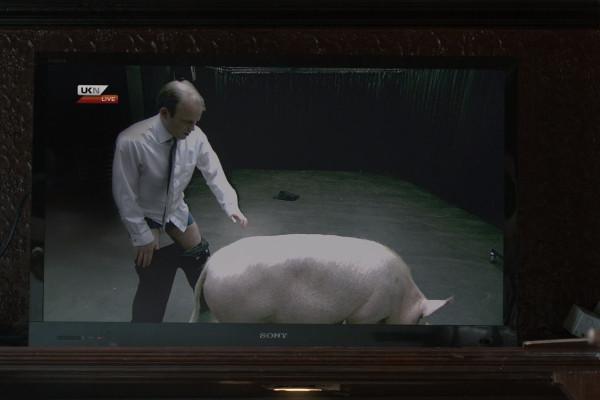Casting a stark light on the dark side of technological advancements, Charlie Brooker's 'Black Mirror' has become a modern paragon of dystopian science fiction. Few episodes embody this morose perspective as deeply or as chillingly as its inaugural offering, 'The National Anthem.'
Unleashed upon an unsuspecting public on December 4, 2011, the episode delivers an audacious and unflinching critique of societal voyeurism facilitated by modern technology. We witness the tale of Prime Minister Michael Callow (Rory Kinnear), compelled to engage in sex with a pig on live television to ensure the safe return of a beloved princess kidnapped by an anonymous artist (Lydia Wilson).
Driven by Jesse Armstrong, the acclaimed writer known for 'Peep Show' and 'The Thick of It,' the episode displays Brooker's knack for satire and commentary on contemporary society. His pen wields an eerie prescience, demonstrated in the actual pig scandal involving former UK Prime Minister David Cameron that came to light in 2015, almost four years post the episode's release. A darkly humorous instance of life imitating art.
Behind the scenes, the creative minds worked relentlessly to craft a bleak yet convincing world. Director Otto Bathurst ('Peaky Blinders') instilled a gruelling sense of realism and tension throughout the episode. Although an initial struggle due to the controversial premise, the team managed to secure quality actors such as Kinnear and Lindsay Duncan ('Sherlock') - testament to the episode's potential for sparking important conversations.
'The National Anthem,' viewed by 1.9 million people on its initial airing, set a tone for 'Black Mirror.' It reflected the series' intent of being a mirror that reflects society's deepest fears and darkest truths. This inaugural episode shares thematic links with later episodes like 'Shut Up and Dance' and 'Hated in the Nation,' highlighting our enthrallment with public shaming and mass hysteria.
The influence of 'The National Anthem' extends beyond its home series. Its legacy permeates popular culture, sparking discussions around the societal implications of technology and media consumption. HBO's 'Westworld' and Netflix's 'Altered Carbon' echo this sentiment, delving into similar dystopian themes of humanity's self-destruction.
Not just a forebearer of 'Black Mirror's trademark unease, 'The National Anthem' also served as a springboard for its actors. Kinnear went on to feature in 'Penny Dreadful,' while Wilson found fame in 'Star Trek: Picard.' Interestingly, 'The National Anthem' also paved the way for 'Black Mirror's' inclination towards casting acclaimed actors in its later seasons, including Jon Hamm, Bryce Dallas Howard, and Miley Cyrus.
In the annals of television, 'Black Mirror's' 'The National Anthem' stands as a harrowing memento of the digital age's unspoken horrors. It's a warning - a timeless testament to the terrifying intersections between public life, personal dignity, and an all-consuming digital landscape.
Through its storytelling, the episode gave birth to a new brand of technological dystopia, one grounded in our everyday reality. A decade since its release, 'The National Anthem' continues to reverberate within popular culture, setting a chilling precedent for subsequent explorations of the theme.
As we look back, we see 'The National Anthem' not just as a television episode but as a cultural artifact - a prescient commentary on society's moral decay in the face of the unstoppable march of technology. For better or worse, it has forever reshaped the landscape of science fiction television, leaving an indelible mark on how we perceive our increasingly digital lives.




























No comments:
Post a Comment